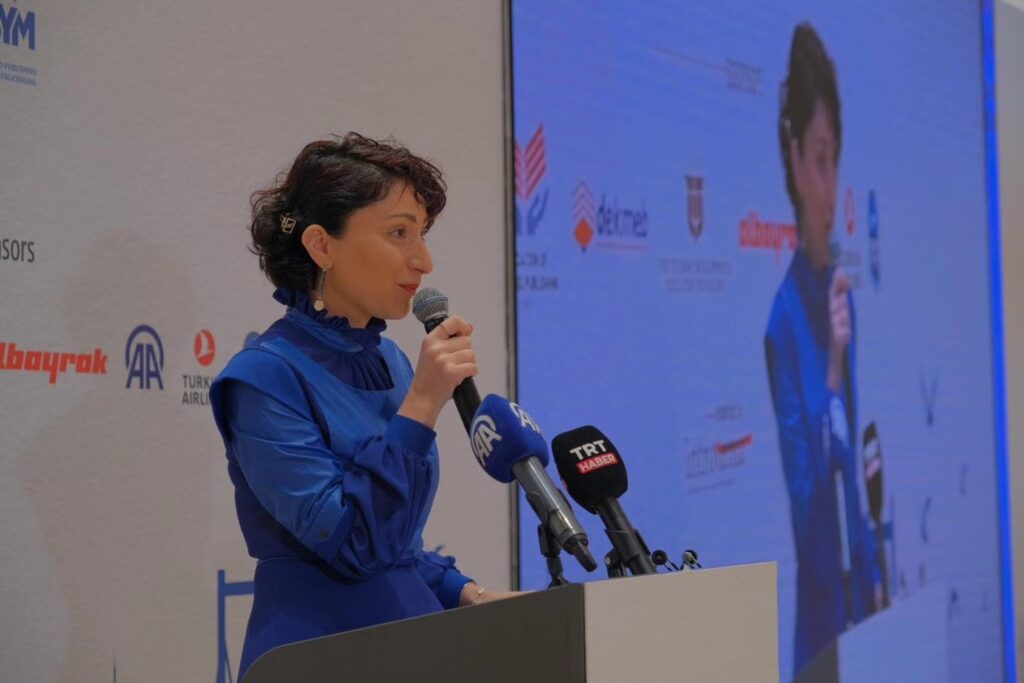Jobava delivered a speech at the opening ceremony where she underlined the importance of the IPA’s pillars of promoting copyright, and, particularly, the freedom to publish. You can read Jobava’s speech below.
The fellowship was the occasion for Jobava to meet with representatives of the IPA’s Turkish member, the Turkish Publishers Association. In addition, with Mexico as focus market, the fellowship was also enabled Jobava to discuss the upcoming 34th International Publishers Congress, scheduled for Guadalajara Mexico on the 3-6 December this year, with IPA Past President Hugo Setzer.
Good morning ladies and gentlemen,
My name is Gvantsa Jobava and I am the Vice President of the International Publishers Association.
It is an honour for me to be here on behalf of the IPA. But as a Georgian publisher, I must say that the opportunity of visiting my neighboring country – Turkiye, makes me feel myself among friends. Recently Turkiye was a focus country at Tbilisi International Book Fair, which helped us a lot to strengthen Georgian-Turkish literary and publishing relationships.
Now it was my turn to visit my Turkish colleagues in their home country again and my thanks Mehmet Burhan GENÇ for the generous invitation. And here let me take this opportunity to congratulate Mexican publishers for being the focus country of the 9th Istanbul Publishing Fellowship.
I am an alumnus of this fellowship myself and really valued the exchanges.
The International Publishers Association, which I represent today, has 101 members from 82 countries. That membership includes Turkish Publishers Association, whose President Kennan Kocatürk is the member of our Executive committee. My first year as IPA Vice President has seen us visit members in 30 countries. Every market is different, but the core challenges are often similar.
Our two pillars are promoting copyright and the freedom to publish. Let me take a couple of minutes to explain why these are both so important to the book sector.
Nowadays the freedom to publish is threatened in many ways – abuse of libel laws, social media pressure, government censorship. This can affect all types of publishing – trade, education and academic. The same pressures can also affect authors, booksellers, librarians eroding not just the freedom to publish, but the freedom of expression and, ultimately the freedom to read.
No country is preserved from these pressures – countries with strong constitutional rights to freedom of expression face organized challenges. Some librarians in the USA feel under pressure to take certain books off the shelves, publishers and authors in the UK have been abusively taken to court using the local libel rules to try to get books withdrawn. In Hungary, booksellers have been fined for selling books considered inappropriate. And here in Turkiye, books can be classed obscene and hidden from sale.
I also know it from my own country where publishing in our own language is a vital part of our future. From my country, where nowadays cultural sector is under a particular threat. Every day we have to fight to preserve our freedom of expression and to avoid self-censorship.
When it comes to copyright, some of the world’s biggest companies want to train their automatic writing machines, sorry, Generative Artificial Intelligence, on books that we have published. Of course they do! wouldn’t you want to use the best writings, professionally edited, written by excellent authors, to train these tools? These companies recognize the value of professionally published books, and they are trying to extract part of that value without a license and without remuneration.
IPA works hard to support publishers and publishers’ associations around the world in promoting the freedom to publish and copyright. What you will do here, the relationships you will build. You will probably not talk directly about the freedom to publish, or perhaps even copyright, although you might want to license a book.
Alongside those two pillars, we also work on issues like literacy, sustainability, diversity and inclusion and accessibility as well as having a committee dedicated to educational publishing. Let me stop here on importance of literacy, which is an effective tool to build the democratic, free society. Educational publishing has also such a great value in developing the critical thinking in the new generations. While publishers are so amazing in creating great books, our governments also need to have clear book promotion policies that encourage reading – reading unconditionally, without any restrictions. There are so many tools available to governments to do this, from cultural vouchers, to zero-rated VAT, fixed book prices or support for a network of public libraries – support of their freedom as well.
If you want to learn more about the IPA, I encourage you to come to the 34th International Publishers Congress – world’s largest gathering of the best publishing experts – taking place from 3-6 December this year in Guadalajara, Mexico. Early bird tickets are available on the Congress website now at publisherscongress.com.
The book sector is amazing, contributing to our societies in so many ways – socially, economically, democratically. Let me close by encouraging you to keep doing what you do, supporting this wonderful sector. But let me ask you to talk about it more, underline that you, as publishers, bring to the creative process.
Have a great fellowship.
Thank you.

